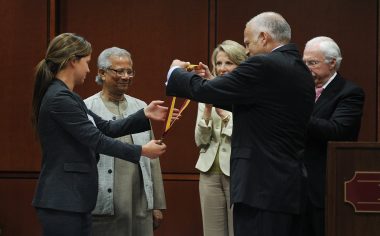Nobel Peace Prize laureate Muhammad Yunus received the Elon University Medal for Entrepreneurial Leadership during an April 4 ceremony.

**********
Muhammad Yunus did not set out to become famous when he founded the Grameen Bank in 1983 in his native Bangladesh. Instead, he was simply trying to help his neighbors.
“I must confess, I did whatever I did out of desperation,” the economist told the audience who gathered at the LaRose Digital Theatre Wednesday morning for a ceremony in his honor. “When you’re totally desperate you do things you never thought … without thinking about the consequences.”
For Yunus, the consequences have truly been remarkable. The revolutionary microcredit system he established has helped provide credit to 5.6 million poor Bangladeshi and countless more across the globe. It has also won him several awards, including the Presidential Medal of Freedom and the World Food Prize. In 2006, he and the Grameen Bank also received the Nobel Peace Prize.
On Wednesday, he added one more honor to the list: The Elon Medal for Entrepreneurial Leadership.
Sponsored by the Doherty Center for Entrepreneurial Leadership and the Martha and Spencer Love School of Business, the medal recognizes an entrepreneur who is a leader in his or her industry and who exemplifies the values of Elon University, including integrity, innovation and creativity, passion for lifelong learning, and a commitment to building a dynamic community.
The ceremony also served as a celebration for the Doherty Center’s fifth anniversary.
“You didn’t know you were coming to a birthday party, did you?” Gary Palin, the center’s executive director, told the audience during his opening remarks. He also took the opportunity to thank those who have supported the center throughout the years, including Joan and Ed Doherty, the entrepreneurs from Saddle River, N.J., whose endowment made the center possible.
During his address, Yunus told the story of how the microcredit system he’s so celebrated for started during his years as an economics professor at Chittagong University in Bangladesh.
At the time, he was teaching economic theories that were difficult to apply outside the classroom, where people were plagued by poverty and dying of hunger.
“You realize that those theories in the textbook look like totally made up stories,” he said. “It gives you a sense of uselessness.”
But out of that uselessness came this idea of leaving his academic knowledge behind to simply be a human being standing by other human beings.
“That I can do,” he remembers telling himself. “I don’t have to learn it a classroom.”
He started going to a nearby village with a simple, yet powerful goal — help one person each day.
So often in a university setting, he said, students only get a bird’s eye view of the world around them — they see a vast territory but cannot make out the individual parts that make up the whole.
What he found out by going out into the world was a different perspective — a worm’s eye view — that allowed him to connect with real people facing real problems. That’s when he discovered that one of the many problems facing the people in the village was lack of credit, which made them depend entirely on loan sharks.
Out that experience, and after several attempts to work within the regular banking system, he decided to fund a bank that provided small loans for self-employment and to establish credit without requiring collateral. He decided to call it the village or “grameen” bank.
He said all people are entrepreneurs in nature but while some tap into that source quickly, others, such as the poor, are prevented from developing an entrepreneurial spirit by the rigid systems imposed by society.
He said that just like a bonsai, which does not grow tall not because the seed is bad but because it’s conditioned by its surroundings, poor people cannot grow because society never gives them the space to fully develop.
He challenged students not to be complacent with the world as it is and see business opportunities as simply moneymaking propositions but rather as a powerful tool to address problems affecting those around them.
“Making money can be a means, but making money cannot be an end,” he said.
“The 21st Century is your century. Don’t live it in the world that we’ve invented. Create a world that you’ll be proud to live in.”
Elon University President Leo M. Lambert presented Yunus with the medal following the address. Prior award recipients include Jim Goodnight, CEO of Raleigh, N.C.-based software company SAS and venture capitalist and former NASA astronaut Bernard A. Harris Jr.


